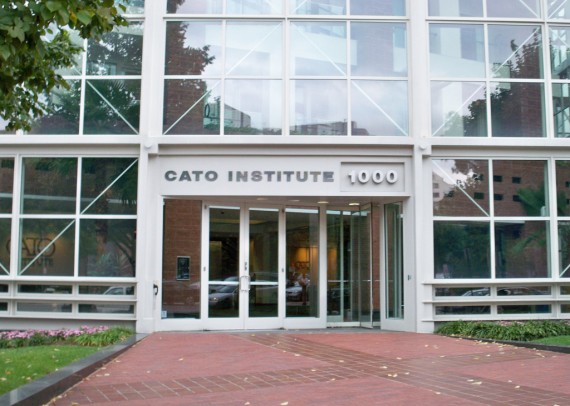Battle For Control Of Cato Institute Reveals Conservative-Libertarian Divide
A legal dispute exposes an open wound.
There’s been much talk inside-the-beltway, as well as among the punditocracy about something that you wouldn’t think would be all that big of a deal. It concerns The Cato Institute, the libertarian think tank founded in 1981 and originally based San Francisco before moving to Washington, D.C. and, eventually, to a sleek glass-front building not too far from Embassy Row. The founding shareholders of Cato were Charles and David Koch (yes, those Koch Brothers), Edward Crane, and William Niskanen, who ha served for a time in the Reagan Administration. As James Joyner noted here back in October, Niskanen died last year at the age of 78. Now, his death has led to a legal battle over control of Cato and it’s revealed yet another aspect of the divide between conservatives and libertarians:
The billionaire brothers Charles and David Koch filed a lawsuit Wednesday for control of the Cato Institute, a libertarian think tank in Washington.
The lawsuit exposes a power struggle for one of Washington’s premiere policy centers, which has been funded by millions in contributions from the Koch brothers’ foundations since its founding in 1974.
Cato was divided between four shareholders: the two Koch brothers, Cato president Ed Crane, and former Cato chairman William Niskanen, according to the lawsuit filed Thursday in a court in Johnson County, Kansas.
At the heart of the dispute is the fate of the shares owned by Niskanen, who died in October at age 78 of complications from a stroke. The Koch brothers believe that they have the option to buy Niskanen’s shares, while Cato officials believe that the shares belong to Niskanen’s widow, Kathryn Washburn, according to the complaint.
It sounds like a fairly standard shareholder dispute of the kind that arises in a closely held corporation after one of the shareholders dies, albeit it is unusual to have an arrangement of this kind for a non-profit entity. From a legal point of view, the answer to who is entitled to the shares is going to be governed by the terms of the Shareholder Agreement and applicable state law. In the several days since this story broke, however, it’s become clear that there’s far more going on here than a simple contract dispute. Instead, what this dispute, which was apparently simmering long before Niskanen died, is all about is an attempt by the Koch Brothers to gain control of Cato in an effort to change its mission into something far more partisan than it’s ever been.
Slate’s David Weigel has a long post yesterday morning that goes into much of the history behind the formation of The Cato Institute and how this dispute came about, it also contains this very revealing anecdote:
In early November, David Koch met with Bob Levy, chairman of Cato’s board of directors, at Dulles International Airport. They were joined by Richard Fink, Koch’s chief adviser, and Kevin Gentry, a vice president of Charles Koch’s charitable foundation who’d been put on Cato’s board of directors. (Former Americans for Prosperity President Nancy Pfotenhauer had joined the board after the same meeting.)
“They said that a principle goal was to defeat Barack Obama,” remembered Levy. “The way David [Koch] put it was, ‘We would like you to provide intellectual ammunition that we can then use at Americans for Prosperity and our allied organizations.’ AFP and others would apply Cato’s work to advance their electoral goals.”
Levy asked them: “What gives you the impression that [Cato isn’t] providing intellectual ammunition?” He says now: “I never got a satisfactory answer. The only answer that makes sense was that Cato needed to be more responsive to their needs. We would take closer marching orders. That’s totally contrary to what we perceive the function of Cato be.”
Assuming it’s accurate, and I have no doubt that Weigel is accurately reporting what he was told, then this vignette puts the entire dispute between the Koch Brothers and Crane and the Niskanen Estate into an entirely new light. For 30-odd years, Cato has built a reputation in Washington as a non-partisan policy analysis shop that hasn’t shie away from criticism of government decisions based on who might be in power. During the Bush years, it was the only think tank “on the right” that was openly critical of the Iraq War, the PATRIOT Act, and the Bush Administration’s rendition and torture policies. Pick a public policy field, and they’ve done work there. You may not always agree with the positions they take, but they’ve certainly added to the debate, and they’ve done it without being beholden to a partisan agenda.
Not surprisingly, this has led to something of an uproar in the libertarian world, especially among those who have been or continue to be associated with Cato. Jerry Taylor, a Senior Fellow at Cato sees trouble ahead if the Koch Brothers gain control and turn the think tank into something resembling Americans For Prosperity by pointing to some of the people that the Koch’s have attempted to install on Cato’s board of late:
Let’s take a look at a few of these new board members of ours. Kevin Gentry is a social conservative activist who’s also vice-chair of the Virginia GOP. Nancy Pfotenauer is a former spokesperson for the McCain campaign who has argued on television in favor of theIraqwar and the “don’t ask, don’t tell” policy pertaining to gays in the military. Ted Olson is a Republican super-lawyer who’s never identified himself as a libertarian.
Just before the last shareholders meeting, the Koch brothers also nominated -but were unable to elect – eight additional individuals for our board. Those nominees included the executive vice president of Koch Industries, a staff lawyer for Koch Industries, a staff lawyer for the Charles Koch Foundation, a former Director of Federal Affairs for Koch Industries, a former Executive Director of the National Republican Senatorial Committee (and who was, incidentally, a McCain bundler), and a lifelong Wichita friend of Charles Koch. Aside from those functionaries, they also nominated a couple of people with public profiles that make the jaw drop:
- John Hinderaker of the Powerline blog, whose firm counts Koch Industries as a client. Hinderaker has written, “It must be very strange to be President Bush. A man of extraordinary vision and brilliance approaching to genius, he can’t get anyone to notice. He is like a great painter or musician who is ahead of his time, and who unveils one masterpiece after another to a reception that, when not bored, is hostile.” Hinderaker supports the Patriot Act and the Iraq War and calls himself a neocon.
- Tony Woodlief, who has been president of two Koch-created nonprofits and vice president of the Charles Koch Foundation. Woodlief has blogged about “the rotten heart of libertarianism,” calling it “a flawed and failed religion posing as a philosophy of governance” while complaining about libertarians “toking up” at political meetings.
Now, who’s more likely to “ensure that Cato stays true to its fundamental principles of individual liberty, free markets, and peace into the future” – these Republican operatives and bloggers or the ousted board members who are among the most independent, principled, and energetic libertarians you’ll ever find?
Moreover, is there any reason for the Kochs to worry about Cato “staying true to its fundamental principles?” What, exactly, signals to them that we are straying, or likely will stray, from those principles?
As far as Charles’ declaration that Cato “not be subject to the personal preferences of individual officers or directors,” it’s hard to square that with the obvious implications of his suit. If Ed were to have his way and the shareholder agreement was dissolved, Ed would answer to 16 autonomous board members. If Charles were to have his way and the shareholder agreement was to govern Cato, then the board – and the president – would ultimately answer to Charles.
Another Cato employee, Jason Kuznicki, is even more blunt:
The real work that Cato does, above all of its specific issue advocacy, is to show that the ordinary constellations of opinion, both left and right, aren’t necessarily so good. Many of Cato’s ideas are already out there, on the left or the right. What Cato does is fit them together in a way that we find is much more consistent and principled. We might be wrong, but at the very least we’re a reasonable challenge to the status quo.
What does Cato say that no other think tank says? Militarism is not the foreign policy best suited to the free market. In fact, it’s the worst foreign policy for a free market. The War on Drugs is not only unnecessary in a free market, but ending it would be a straightforward implementation of free market principles. And the freedom to buy and sell is a sick joke without robust civil liberties for all. Conversely, most people want their civil liberties partly so that they can earn a living and enjoy economic opportunities.
That is what Cato is about. That is also apparently why the Kochs are trying to destroy it.
I can’t understand how people who are so smart in business can be so boneheaded when it comes to activism. It’s a painfully stupid decision. Even if it were innocent — which it’s not — it still looks horrible. It’s as if the Kochs set out to prove every last thing that progressives have ever said about them.
To sue William Niskanen’s widow is atrocious all by itself, an act worthy of a cartoon plutocrat. They appear to have been biding their time until he died, which is just ghoulish. Everyone from left to right admired Bill’s honesty, courage, and intellectual rigor, even if they disagreed with him. He was a fine scholar and a true gentleman. I worked with him very closely on his last book, I saw his good qualities and learned a lot from him, and I am appalled that the Kochs would burden his widow in their bid for control.
And, in what appears to be a preview of what’s likely to happen if the Koch brothers win this legal battle and succeed in their apparent vision, Julian Sanchez, who has been writing on civil liberties issues at Cato for years, has already announce what he’ll do if they end up winning:
I can’t imagine being able to what I do unless I’m confident my work is being judged on the quality of the arguments it makes, not its political utility—or even, ultimately, ideological purity. Obviously Cato has an institutional viewpoint, and I wouldn’t have been hired in the first place if my views on the topics I write about weren’t pretty reliably libertarian. But when it comes down to specific issues and controversies, nobody tells me what to write. If my honest appraisal of the evidence on a particular question leads me to a conclusion that’s not “helpful” in the current media cycle’s partisan squabble, or that differsfrom either the “official” libertarian line, or from the views of my colleagues, I can write it without worrying that I’ll be summoned to the top floor to explain why I’m “off message.” That’s the essential difference between an analyst and an activist: I can promise readers that what appears under my name—whether I get it right or wrong—represents my sincere best effort to figure out what would be good policy, not an attempt to supply a political actor with a talking point. If I couldn’t make that promise, I’d have no right to expect people to take my work seriously.
As I said, I’m in no great hurry to leae a job I enjoy a lot—so I’m glad this will probably take a while to play out either way. But since I’m relatively young, and unencumbered by responsibility for a mortgage or kids, I figure I may as well say up front that if the Kochs win this one, I will. I’m not flattering myself that they’ll especially care; I’d just be saving their appointee the trouble of canning me down the road. But I suspect I wouldn’t be the only one looking for the door under the administration they seem to be envisioning, and my hope is that saying this publicly now might encourage someone in the Koch empire to reconsider whether they can win this particular prize without damaging it.
Perhaps you don’t think this is a big deal if you’re not a libertarian or you don’t pay much attention to the public policy think tank world, that’s your choice. However, when an independent voice is under attack from those who would turn it into little more than a partisan mouthpiece, I think that’s something worth taking note of. I’m not signing on to the whole “Koch brothers are evil” meme. They have every right to spend their money however they wish, and the First Amendment permits them to establish and fund organizations that support their point of view. I don’t really have a problem with what organizations like Americans for Prosperity or Freedomworks do, and they do it very well. I’m also not commenting on the legal merits of the lawsuit that’s been filed in a state court in Kansas that will apparently end up deciding this entire dispute. However, it strikes me that if the end result of all this is the stifling of an independent voice in the public policy debate, then all of us will end up being the losers.
On a broader level, though, I think this clash of visions is a pretty apt demonstration of the conflict between activist conservatives and intellectual libertarians. The Koch brothers have, quite obviously, cast their lot with the activist conservative crowd. Such is their right, but it’s not the only way to advance the cause and the ideas of individual liberty. Cato and other organizations like The Reason Foundation have stood for the idea that the best way to advance the cause of liberty is through persuasion rather than partisanship. In Cato’s case, it’s meant taking positions anathema to a Republican President, or in alliance Democrats. Does anyone really think that such things would happen under the kind of vision the David Koch communicated to Bob Levy back in November? Of course it wouldn’t. It would just be another partisan hack shop and, with the likelihood that guys like Julian Sanchez would be long gone, far less interesting in terms of the ideas they’ be putting forward.







I don’t mean this to be snarky, but does it occur to you that libertarians are the new social conservatives? In the sense that the GOP Money wing uses them when they’re useful to win elections, but tosses them aside once we get down to business?
Michael,
Not to be snarky, but… how is the GOP using libertarians to win elections and then tossing them aside afterward any different from how it’s been for a really, really long time? The social conservatives get more post-election bones thrown their way than libertarians do, I think.
@Trumwill:
Touché.
@michael reynolds:
Life as a Libertarian
Wow, I cannot believe that this partisan gridlock has even spread to reliably independent institutions such as Cato. Is this really happening? How much lower can we all get before we bottom out and just work together? You know, like the good ol’ days.
Surprise, surprise. People who finance “think tanks” want them to produce literature supporting their political agenda.
Have you ever heard a politico make any reference to Cato’s position on the Iraq war or the Patriot Act or any position not strictly serving the GOP talking point of the day?
This outcome was completely predictable and is not a tragedy. In effect, Cato has had zero influence on the political debate when their position didn’t perfectly fit their sponsor’s views, and therefore never offered a real challenge to the status quo.
To be a conservative in America these days is to sign up to a world view where ideas only hold importance to the extent that they help advance an agenda. Useful idiots can always be found to churn out justifications and rationalizations. If anything sticks against the wall then it was money well spent. In any case, think-tank patrons are buying in bulk (I’ll take ten pounds of…) and prefer the latest fashions rather than anything built to last. In the worst case, should nothing hold up, then pick something that flatters the base and annoys those liberals, and push it relentlessly. Whatever I say three times is true.
Science has unfortunately had to be thrown under a bus. For some reason, only 1% of scientists has been willing to play along, no matter how much money has been tangled in front of them. Luckily political hacks come a dime a dozen.
Here’s something interesting from that Jerry Taylor piece linked to in Doug’s posting:
So it would appear that the Kochs are busy pushing hard not based on any kind of “majority shareholder” rank but on sheer gall and knowing that non-profits are not financially able to sustain major legal efforts.
I wish you’d evaluate the legal aspects of the contract, Doug. Do the Kochs have a leg to stand on or are they just pushing/rushing hard?
Who cares? Demographic changes of the U.S. are going to make libertarian politics more irrelevant than conservative politics.
Does anyone believe that anyone inside the Democratic Party would be interested in true libertarian politics. Look at how progressives are pushing for legalized drugs while wanting to expanding government funded drug treatment. Could anything be farther away from libertarian ideals?
Hmmmm…. seems to be blanks so far.
The only Cato material I’ve ever read has related to economic issues and it is unrelentingly conservative in outlook. Almost comically so at times. The great depression and the 80 years or so since of practical experience and accumulation of knowledge about how economies actually work might never of happened. On the strictly legal issue of ownership as numerous commenters have pointed out (those on the liberal side falling over with glee) it would appear that Cato is actually the property of the Koch’s. They are just asserting their control. Will they be asserting their control at George Mason next, at least some parts of which are already to all intents and purposes wholly owned subsidiaries of Koch Industries.
C’mon…this is how Republicans roll. Bruce Bartlett was fired from National Center for Policy Analysis for being critical of 43’s policies…especially his support for Medicare Part D which was one of the greatest unpaid for expansions of entitlements ever. Frum got kicked out of the AEI, probably for his brilliant Waterloo essay. Independent voices will not be tolerated in the GOP. If this is a suprise to you, or you think it’s a recent development you haven’t been paying attention. It’s also why they are all so f’ing afraid of speaking out against Rushbo’s misogyny.
@ Joe…
They’ve already asserted their control over the SCOTUS.
@DRS:
What they’ve recently donated is irrelevant. It’s how it was originally set up as non profit (ha ha) and its articles of incorporation.
Well, if the Kochs get their way, the modicum of respect I have for Cato will be gone. It’s the one Conservative group that I’ve seen regularly challenge GOP orthodoxy (well, I guess Daniel Larison over at The American Conservative counts too, but I gather Cato has more reach). I’m not a libertarian, but I could at least respect them as somewhat independent, rather than just being mouthpieces.
The Kochs want mouthpieces, it seems. The one part that is mildly surprising is their specific choices for the board. Not libertarians *at all* So far, I had assumed that the Kochs, however much I disagreed with them, were actually libertarians. With, like, some principles (however wrong-headed).
I appreciate your coverage, but please work harder at getting your facts right. Neither David Koch nor Bill Niskanen were original shareholders. Niskanen was added when original shareholders Rothbard and McBride were drummed out in 1981. David Koch didn’t become a shareholder until 1991. You can learn this by reading the exhibits attached to the Koch’s complaint, linked in Allen McDuffee’s original coverage of the suit at WAPO.
Doug M says the shareholder agreement and state law will govern. Cato Sr. Fellow Jerry Taylor says, “If Charles were to have his way and the shareholder agreement was to govern Cato, then the board – and the president – would ultimately answer to Charles.” Apparently Mr. Taylor is familiar with the agreement and believes it supports the Koch bros position. Aren’t libertarians supposed to be big on contracts?
Doug M further says, “Perhaps you don’t think this is a big deal if you’re not a libertarian or you don’t pay much attention to the public policy think tank world, that’s your choice.” I’m afraid most of us who aren’t libertarian already regarded Cato as irrelevant and feel this is pretty much between the Judean Peoples Front and the Peoples Front of Judea.
It is nice, though, to see the Koch bros out in the public light buying think tank opinions a week after claiming Obama was picking on them.
It’s always a disappointment, learning someone you thought was principled is actually just an opportunist.
@Rob in CT:
Are you serious? They’re libertarian to the extent it impacts their interests. In political terms the Libertarians with a large L are what they have always been…..Republican’s useful idiots. This is why they allow Ron Paul to be a Republican and try not to annoy him too much in case he bolts and makes a third party presidential run. Not that that is likely since his Libertarian son is ………ahem…..a Republican senator.
Yes, I’m serious. I thought they were twuu believahs (with all the self-delusion that entailed, given how much $ they inherited).
“Demographic changes of the U.S. are going to make libertarian politics more irrelevant than conservative politics.”
That’s hard to do, since libertarians have been nothing more than rounding errors in the body politic for decades.
Cato Institute? Libertarian??
The thumbnail would seem to be that Cato built a pretty good brand, despite partisan funding, and now the founders are willing to risk that brand for short-term gain.
(Actually, they seem unaware that a public fight destroys the brand.)
(Cato always seemed a cut above, say, the American Enterprise Institute. The later’s transparent positions on climate change and etc. make them an obvious PR firm, as opposed to a think tank. Should Cato go that way, I’m not sure the Kochs would gain as much as they think … unless they are willing to burn Cato in one last gasp …)
@john personna: (Actually, they seem unaware that a public fight destroys the brand.)
I suspect the Kochs think the rubes will believe what they are told to believe and, sadly, be quite correct.
@OzarkHillbilly:
The Cato brand to the extent it’s known (which after all isn’t a very wide audience) really only has cred with the right.
There’s some nice insided scuttlebut here on the Cato takeover ….I particularly like the Hinderaker (who the Koch’s are attempting to put on the board) comment on the sublime genius of Dubya…it’s worth a read for that alone.
http://volokh.com/2012/03/03/koch-v-cato-a-view-from-cato/
@Rob in CT:
You said you’d never compromise
With the mystery tramp, but know you realize
He’s not selling any alibis
As you stare into the vacuum of his eyes
And say do you want to make a deal?
Its so hard when you discover that
he’s not really where its at